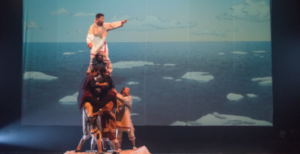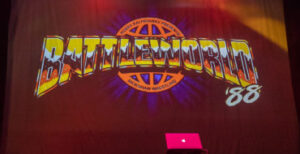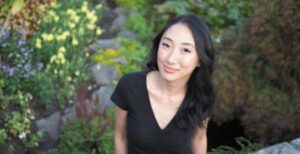
Day three and V.I.P.F has hit its stride, so to speak. The next few days will be filled with events, workshops, parties and the culmination of the week: The Canadian Individual Poetry Slam Championship, which will whittle forty Canadian spoken word artists down to ten deadly sharp performers to appear at the finals Saturday night.
Procrastinators, the chronically tardy and the just unlucky competed last night at Café Deux Soleils for late entry into the championship. Unfortunately, your indefatigable reporter had a previous commitment, so she missed Saskatoon poet Leah Horlick winning her spot in the next two days of slam bouts. Never fear, however, there will be plenty of opportunity to see Horlick as she vies for championship.
Luckily, however, no commitment could bar me from the late night event at Eternal Abundance. The affair was Poets’ Delight featuring Scruffmouth, Jillian Christmas and the Black Dots Roots & Culture Collective.
According to festival volunteer coordinator and local poet Sonya Littlejohn, the format was conceived as a variation of Vancouver’s bi-monthly Temple of Word, designed to “showcase the possibility for dialogue” and served as a break from the aspect of competition pervading other parts of the festival. The evening began with two Temple of the Word poets rhapsodizing on the theme of
abundance (Littlejohn says she likes “big umbrella” topics as thematic material), in what seemed to be a response to the previous Temple of the Word feature poets.
Since many of the poets and audience members were out-of-town guests here for the festival, responsive nature of the show had to adapt to the singularity of the event. To that end, the festival provided booklets and post-its to the audience for the purpose of love-notes, anonymous or signed, for the performers. There was something sweetly analog about the candy-colored slips sticking to the notebook pages, bringing to mind the day when we passed in folded pages class instead of liking someone’s Facebook status.
The vibe of the night was casual and receptive, warm lighting and conviviality abundant. The neatly lined folding chairs went from full to empty and casually strewn as the crowd thinned—not for lack of brilliance, to be sure, but because the hours quickly flipped from late evening to early morning, and most had attended the earlier slam as well. Enthusiasm, however, did not fade, and the poets sustained the energy of the remaining spectators.
The centerpiece of the first half was featured poet Scruffmouth, a Vancouver-based artist. Call-and-response, which Littlejohn describes as a “tradition” came heavily into play. The works were a love song to the community, to the old days of Hogan’s Alley and playground sports, to culture and nostalgia and togetherness. It’s difficult to describe, but let me say this: If you ever have a chance to see this poet,
do. He’s local, he’s brilliant and there’s really no excuse not to.
The prompt of the night was “The Next Generation,” and the remainder of the performance was devoted to rapid-fire poetry, using the prompt as a leitmotif. It would be near impossible and most likely tedious to list all the poets and their pieces, so the highlights will have to do.
Personal favorites from the first round include Jen Kunlire’s musically tinged poem singing/asking, “Where have all the children gone?” in her gorgeous croon and Sasha Wiley’s composition on being a schoolteacher. Wiley, a teacher, spends every day confronting the next generation, and knows them perhaps better than they know themselves. Her passion came through her work, as did the frustration with the struggle of a teacher in the B.C. system and current political climate.
After the break we were treated to a show-stopping performance by poet and musician Chelsea D.E. Johnson. Her first song, co-written with youth from the Urban Native Youth Association (UNYA), was a heartbreaking ballad told from the perspective a First Nations child. The lyrics, which touched on addiction, abuse and the scars of colonialism, were made all the more moving by Johnson’s incredibly powerful voice.
Speaking about the UNYA collaboration after the show, Johnson called the time she spent with the youth “opened me up… It was a huge learning experience.”
Jillian Christmas, Vancouver’s newly inducted slam champion, joined Johnson onstage for a handful of gorgeous duets. Johnson played guitar; both ladies sang. The space where verses usually go were filled with Christmas’ poetry and Johnson’s bluesy backup vocals. The combination of the two talents was impressive and effective in a way that spoken word and musical collaborations rarely are (in this reporter’s experience, anyway; maybe I need to get out more). The ladies rounded out their time with a rousing cover of the gospel traditional “In My Time of Dying.”
The last half of the evening slipped away as we slid through the last few poets. It got late, the audience diminished, the mood became cozier, more at home. We were the stragglers, the last few late-night observers.
Midnight standouts included Calgarian Erin Dingle’s dizzy blaze of Star Trek erotica and Uncommonly Andre’s impressive extempore musings, backed up by Johnson’s gentle guitar.
As a finale, we were treated to the eminently strange duo 2 Dope Boys in Cadillac. Purporting to be preservationists of the “traditional folk music of the Cadillac Mountains” and the ancient art of water-bowling, poets shayne avec i grec and Johnny Macrae (also known as half of Tuesday’s Mashed Poetics quartet) gave a performance that was, well, awesomely weird-as-fuck. Shayne avec i grec reflected on the next generation of sexual contact complicated by technological alienation while Macrae water-bowled, or, blew into a tin bowl of water
real real close to the mic. The effect a bit like beatboxing and a bit like extremely loud cunnilingus. It was strange and hilarious and probably the most fabulously bizarre thing I’ve seen all week.
The poetic reactions were astonishingly diverse, touching sex and Captain Picard to children and families, heartbreak, birth, politics and the apocalypse. If ever you have any doubt on whether poetry is still worth a damn, see how contemporary poets engage these questions. The threads of last night’s works interlaced despair and hope, sexuality and sterility, community and loneliness. The poetic community invokes these questions, demands that we ask them of ourselves and of each other: What will we leave? What should we leave? What do we want to leave?
Still need proof that poetry’s worth a damn? The first bouts of the Canadian Individual Poetry Slam Finals start tonight (Thursday) at Café Deux Soleils and Eternal Abundance. Your tenacious reporter will be there to document
 Day three and V.I.P.F has hit its stride, so to speak. The next few days will be filled with events, workshops, parties and the culmination of the week: The Canadian Individual Poetry Slam Championship, which will whittle forty Canadian spoken word artists down to ten deadly sharp performers to appear at the finals Saturday night.
Procrastinators, the chronically tardy and the just unlucky competed last night at Café Deux Soleils for late entry into the championship. Unfortunately, your indefatigable reporter had a previous commitment, so she missed Saskatoon poet Leah Horlick winning her spot in the next two days of slam bouts. Never fear, however, there will be plenty of opportunity to see Horlick as she vies for championship.
Luckily, however, no commitment could bar me from the late night event at Eternal Abundance. The affair was Poets’ Delight featuring Scruffmouth, Jillian Christmas and the Black Dots Roots & Culture Collective.
According to festival volunteer coordinator and local poet Sonya Littlejohn, the format was conceived as a variation of Vancouver’s bi-monthly Temple of Word, designed to “showcase the possibility for dialogue” and served as a break from the aspect of competition pervading other parts of the festival. The evening began with two Temple of the Word poets rhapsodizing on the theme of abundance (Littlejohn says she likes “big umbrella” topics as thematic material), in what seemed to be a response to the previous Temple of the Word feature poets.
Since many of the poets and audience members were out-of-town guests here for the festival, responsive nature of the show had to adapt to the singularity of the event. To that end, the festival provided booklets and post-its to the audience for the purpose of love-notes, anonymous or signed, for the performers. There was something sweetly analog about the candy-colored slips sticking to the notebook pages, bringing to mind the day when we passed in folded pages class instead of liking someone’s Facebook status.
The vibe of the night was casual and receptive, warm lighting and conviviality abundant. The neatly lined folding chairs went from full to empty and casually strewn as the crowd thinned—not for lack of brilliance, to be sure, but because the hours quickly flipped from late evening to early morning, and most had attended the earlier slam as well. Enthusiasm, however, did not fade, and the poets sustained the energy of the remaining spectators.
The centerpiece of the first half was featured poet Scruffmouth, a Vancouver-based artist. Call-and-response, which Littlejohn describes as a “tradition” came heavily into play. The works were a love song to the community, to the old days of Hogan’s Alley and playground sports, to culture and nostalgia and togetherness. It’s difficult to describe, but let me say this: If you ever have a chance to see this poet, do. He’s local, he’s brilliant and there’s really no excuse not to.
The prompt of the night was “The Next Generation,” and the remainder of the performance was devoted to rapid-fire poetry, using the prompt as a leitmotif. It would be near impossible and most likely tedious to list all the poets and their pieces, so the highlights will have to do.
Personal favorites from the first round include Jen Kunlire’s musically tinged poem singing/asking, “Where have all the children gone?” in her gorgeous croon and Sasha Wiley’s composition on being a schoolteacher. Wiley, a teacher, spends every day confronting the next generation, and knows them perhaps better than they know themselves. Her passion came through her work, as did the frustration with the struggle of a teacher in the B.C. system and current political climate.
After the break we were treated to a show-stopping performance by poet and musician Chelsea D.E. Johnson. Her first song, co-written with youth from the Urban Native Youth Association (UNYA), was a heartbreaking ballad told from the perspective a First Nations child. The lyrics, which touched on addiction, abuse and the scars of colonialism, were made all the more moving by Johnson’s incredibly powerful voice.
Speaking about the UNYA collaboration after the show, Johnson called the time she spent with the youth “opened me up… It was a huge learning experience.”
Jillian Christmas, Vancouver’s newly inducted slam champion, joined Johnson onstage for a handful of gorgeous duets. Johnson played guitar; both ladies sang. The space where verses usually go were filled with Christmas’ poetry and Johnson’s bluesy backup vocals. The combination of the two talents was impressive and effective in a way that spoken word and musical collaborations rarely are (in this reporter’s experience, anyway; maybe I need to get out more). The ladies rounded out their time with a rousing cover of the gospel traditional “In My Time of Dying.”
The last half of the evening slipped away as we slid through the last few poets. It got late, the audience diminished, the mood became cozier, more at home. We were the stragglers, the last few late-night observers.
Midnight standouts included Calgarian Erin Dingle’s dizzy blaze of Star Trek erotica and Uncommonly Andre’s impressive extempore musings, backed up by Johnson’s gentle guitar.
As a finale, we were treated to the eminently strange duo 2 Dope Boys in Cadillac. Purporting to be preservationists of the “traditional folk music of the Cadillac Mountains” and the ancient art of water-bowling, poets shayne avec i grec and Johnny Macrae (also known as half of Tuesday’s Mashed Poetics quartet) gave a performance that was, well, awesomely weird-as-fuck. Shayne avec i grec reflected on the next generation of sexual contact complicated by technological alienation while Macrae water-bowled, or, blew into a tin bowl of water real real close to the mic. The effect a bit like beatboxing and a bit like extremely loud cunnilingus. It was strange and hilarious and probably the most fabulously bizarre thing I’ve seen all week.
The poetic reactions were astonishingly diverse, touching sex and Captain Picard to children and families, heartbreak, birth, politics and the apocalypse. If ever you have any doubt on whether poetry is still worth a damn, see how contemporary poets engage these questions. The threads of last night’s works interlaced despair and hope, sexuality and sterility, community and loneliness. The poetic community invokes these questions, demands that we ask them of ourselves and of each other: What will we leave? What should we leave? What do we want to leave?
Still need proof that poetry’s worth a damn? The first bouts of the Canadian Individual Poetry Slam Finals start tonight (Thursday) at Café Deux Soleils and Eternal Abundance. Your tenacious reporter will be there to document
Day three and V.I.P.F has hit its stride, so to speak. The next few days will be filled with events, workshops, parties and the culmination of the week: The Canadian Individual Poetry Slam Championship, which will whittle forty Canadian spoken word artists down to ten deadly sharp performers to appear at the finals Saturday night.
Procrastinators, the chronically tardy and the just unlucky competed last night at Café Deux Soleils for late entry into the championship. Unfortunately, your indefatigable reporter had a previous commitment, so she missed Saskatoon poet Leah Horlick winning her spot in the next two days of slam bouts. Never fear, however, there will be plenty of opportunity to see Horlick as she vies for championship.
Luckily, however, no commitment could bar me from the late night event at Eternal Abundance. The affair was Poets’ Delight featuring Scruffmouth, Jillian Christmas and the Black Dots Roots & Culture Collective.
According to festival volunteer coordinator and local poet Sonya Littlejohn, the format was conceived as a variation of Vancouver’s bi-monthly Temple of Word, designed to “showcase the possibility for dialogue” and served as a break from the aspect of competition pervading other parts of the festival. The evening began with two Temple of the Word poets rhapsodizing on the theme of abundance (Littlejohn says she likes “big umbrella” topics as thematic material), in what seemed to be a response to the previous Temple of the Word feature poets.
Since many of the poets and audience members were out-of-town guests here for the festival, responsive nature of the show had to adapt to the singularity of the event. To that end, the festival provided booklets and post-its to the audience for the purpose of love-notes, anonymous or signed, for the performers. There was something sweetly analog about the candy-colored slips sticking to the notebook pages, bringing to mind the day when we passed in folded pages class instead of liking someone’s Facebook status.
The vibe of the night was casual and receptive, warm lighting and conviviality abundant. The neatly lined folding chairs went from full to empty and casually strewn as the crowd thinned—not for lack of brilliance, to be sure, but because the hours quickly flipped from late evening to early morning, and most had attended the earlier slam as well. Enthusiasm, however, did not fade, and the poets sustained the energy of the remaining spectators.
The centerpiece of the first half was featured poet Scruffmouth, a Vancouver-based artist. Call-and-response, which Littlejohn describes as a “tradition” came heavily into play. The works were a love song to the community, to the old days of Hogan’s Alley and playground sports, to culture and nostalgia and togetherness. It’s difficult to describe, but let me say this: If you ever have a chance to see this poet, do. He’s local, he’s brilliant and there’s really no excuse not to.
The prompt of the night was “The Next Generation,” and the remainder of the performance was devoted to rapid-fire poetry, using the prompt as a leitmotif. It would be near impossible and most likely tedious to list all the poets and their pieces, so the highlights will have to do.
Personal favorites from the first round include Jen Kunlire’s musically tinged poem singing/asking, “Where have all the children gone?” in her gorgeous croon and Sasha Wiley’s composition on being a schoolteacher. Wiley, a teacher, spends every day confronting the next generation, and knows them perhaps better than they know themselves. Her passion came through her work, as did the frustration with the struggle of a teacher in the B.C. system and current political climate.
After the break we were treated to a show-stopping performance by poet and musician Chelsea D.E. Johnson. Her first song, co-written with youth from the Urban Native Youth Association (UNYA), was a heartbreaking ballad told from the perspective a First Nations child. The lyrics, which touched on addiction, abuse and the scars of colonialism, were made all the more moving by Johnson’s incredibly powerful voice.
Speaking about the UNYA collaboration after the show, Johnson called the time she spent with the youth “opened me up… It was a huge learning experience.”
Jillian Christmas, Vancouver’s newly inducted slam champion, joined Johnson onstage for a handful of gorgeous duets. Johnson played guitar; both ladies sang. The space where verses usually go were filled with Christmas’ poetry and Johnson’s bluesy backup vocals. The combination of the two talents was impressive and effective in a way that spoken word and musical collaborations rarely are (in this reporter’s experience, anyway; maybe I need to get out more). The ladies rounded out their time with a rousing cover of the gospel traditional “In My Time of Dying.”
The last half of the evening slipped away as we slid through the last few poets. It got late, the audience diminished, the mood became cozier, more at home. We were the stragglers, the last few late-night observers.
Midnight standouts included Calgarian Erin Dingle’s dizzy blaze of Star Trek erotica and Uncommonly Andre’s impressive extempore musings, backed up by Johnson’s gentle guitar.
As a finale, we were treated to the eminently strange duo 2 Dope Boys in Cadillac. Purporting to be preservationists of the “traditional folk music of the Cadillac Mountains” and the ancient art of water-bowling, poets shayne avec i grec and Johnny Macrae (also known as half of Tuesday’s Mashed Poetics quartet) gave a performance that was, well, awesomely weird-as-fuck. Shayne avec i grec reflected on the next generation of sexual contact complicated by technological alienation while Macrae water-bowled, or, blew into a tin bowl of water real real close to the mic. The effect a bit like beatboxing and a bit like extremely loud cunnilingus. It was strange and hilarious and probably the most fabulously bizarre thing I’ve seen all week.
The poetic reactions were astonishingly diverse, touching sex and Captain Picard to children and families, heartbreak, birth, politics and the apocalypse. If ever you have any doubt on whether poetry is still worth a damn, see how contemporary poets engage these questions. The threads of last night’s works interlaced despair and hope, sexuality and sterility, community and loneliness. The poetic community invokes these questions, demands that we ask them of ourselves and of each other: What will we leave? What should we leave? What do we want to leave?
Still need proof that poetry’s worth a damn? The first bouts of the Canadian Individual Poetry Slam Finals start tonight (Thursday) at Café Deux Soleils and Eternal Abundance. Your tenacious reporter will be there to document 








